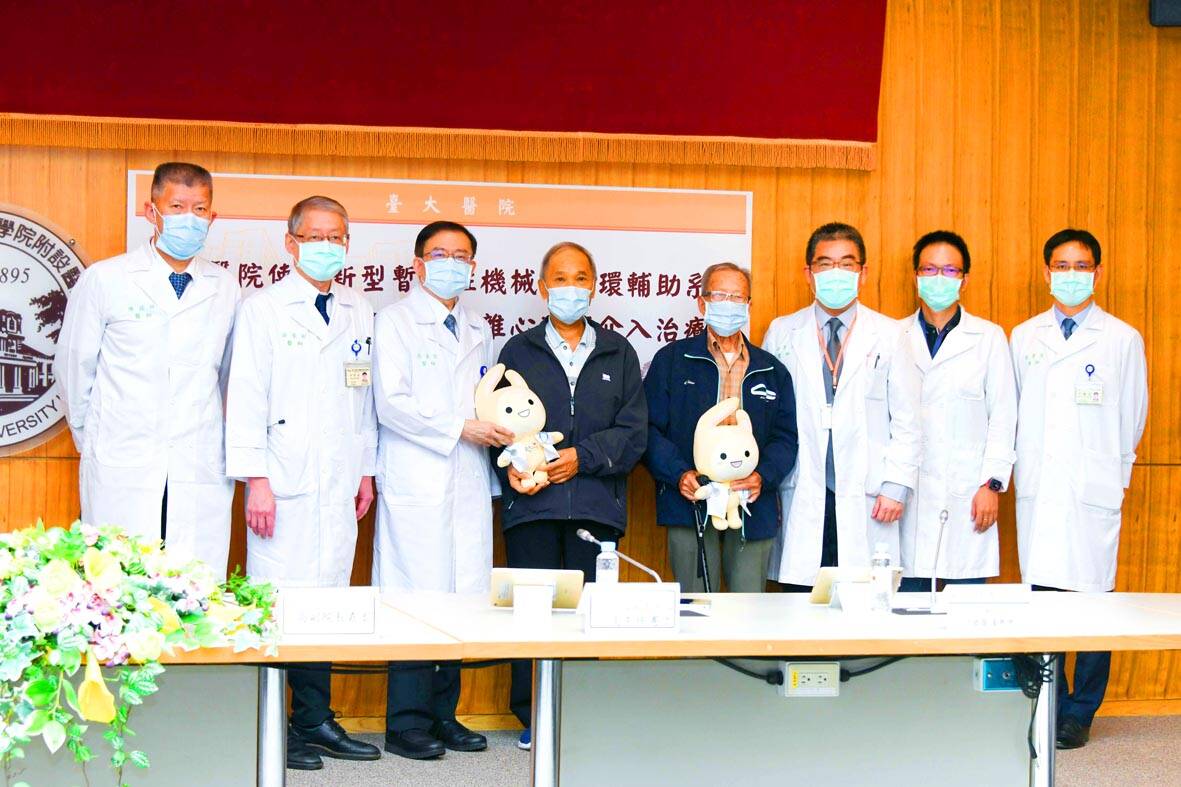National Taiwan University Hospital (NTUH) yesterday reported that it had performed percutaneous coronary interventions with a new temporary mechanical circulatory support (TCS) device on two patients with severe coronary artery disease — marking the first two successful cases in Taiwan.
NTUH Division of Cardiology assistant professor Huang Ching-chang (黃慶昌) said it has been tricky to treat people with serious complex coronary artery disease and severely depressed left ventricular function, because the best treatment option is a coronary bypass, which might not be suitable for some elderly patients or patients with multiple comorbidities.
Percutaneous coronary intervention is an option for such people, he said.

Photo: Chiu Chih-jou, Taipei Times
While it is a minimally invasive procedure and allows for faster recovery, there are still risks of complications, such as hemodynamic instability and cardiac arrest, and that due to the high risks, doctors can often only deal with the most serious symptoms, Huang added.
Many specialists around the world have suggested that TCS devices can be used on complex higher-risk and indicated patients during percutaneous coronary interventions to avoid acute cardiac arrest or other serious complications during the procedure, he said.
Common TCS devices include an intra-aortic balloon pump, which has weaker circulatory support and might not be helpful to patients with high risk of serious complications, and extracorporeal membrane oxygenation, which has a higher risk of complications and might increase the burden on the left ventricle.
The NTUH introduced a new percutaneous micro-axial left ventricular assist device, which is a catheter-mounted axial-flow pump that can be inserted in the femoral artery and enters the left ventricle, providing hemodynamic support in high-risk procedures and reducing complications.
It performed its first two successful operations on Oct. 18. One of the patients is a man in his 70s, surnamed Kao (高), who had high blood pressure and cholesterol levels, and difficulty breathing. He was diagnosed with left ventricular enlargement, coronary artery calcification and stenosis, and left circumflex artery blockage.
Kao said he was afraid of getting a coronary bypass, but agreed to the percutaneous coronary intervention procedure.
He said he was surprised he could get out of bed and walk the following day, and can now walk to a nearby market without having to stop three times to rest liked he used to.
The other patient is a man in his 90s, surnamed Huang (黃), who has high blood pressure and cholesterol levels, as well as chronic kidney disease.
He had been hospitalized three times for acute heart failure in four months.
Huang said he used to need to rest several times when climbing the stairs to his second-floor apartment.
He said he has since recovered about 90 percent and no longer has difficulty breathing when climbing stairs.

An essay competition jointly organized by a local writing society and a publisher affiliated with the Chinese Communist Party (CCP) might have contravened the Act Governing Relations Between the People of the Taiwan Area and the Mainland Area (臺灣地區與大陸地區人民關係條例), the Mainland Affairs Council (MAC) said on Thursday. “In this case, the partner organization is clearly an agency under the CCP’s Fujian Provincial Committee,” MAC Deputy Minister and spokesperson Liang Wen-chieh (梁文傑) said at a news briefing in Taipei. “It also involves bringing Taiwanese students to China with all-expenses-paid arrangements to attend award ceremonies and camps,” Liang said. Those two “characteristics” are typically sufficient

A magnitude 5.9 earthquake that struck about 33km off the coast of Hualien City was the "main shock" in a series of quakes in the area, with aftershocks expected over the next three days, the Central Weather Administration (CWA) said yesterday. Prior to the magnitude 5.9 quake shaking most of Taiwan at 6:53pm yesterday, six other earthquakes stronger than a magnitude of 4, starting with a magnitude 5.5 quake at 6:09pm, occurred in the area. CWA Seismological Center Director Wu Chien-fu (吳健富) confirmed that the quakes were all part of the same series and that the magnitude 5.5 temblor was

The brilliant blue waters, thick foliage and bucolic atmosphere on this seemingly idyllic archipelago deep in the Pacific Ocean belie the key role it now plays in a titanic geopolitical struggle. Palau is again on the front line as China, and the US and its allies prepare their forces in an intensifying contest for control over the Asia-Pacific region. The democratic nation of just 17,000 people hosts US-controlled airstrips and soon-to-be-completed radar installations that the US military describes as “critical” to monitoring vast swathes of water and airspace. It is also a key piece of the second island chain, a string of

The Central Weather Administration has issued a heat alert for southeastern Taiwan, warning of temperatures as high as 36°C today, while alerting some coastal areas of strong winds later in the day. Kaohsiung’s Neimen District (內門) and Pingtung County’s Neipu Township (內埔) are under an orange heat alert, which warns of temperatures as high as 36°C for three consecutive days, the CWA said, citing southwest winds. The heat would also extend to Tainan’s Nansi (楠西) and Yujing (玉井) districts, as well as Pingtung’s Gaoshu (高樹), Yanpu (鹽埔) and Majia (瑪家) townships, it said, forecasting highs of up to 36°C in those areas